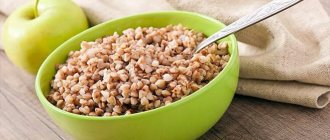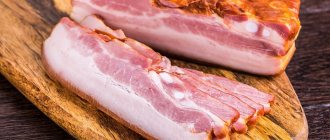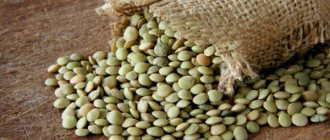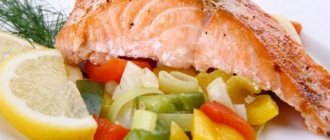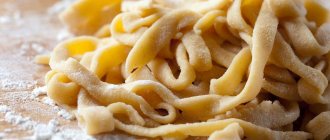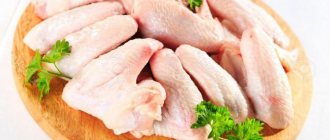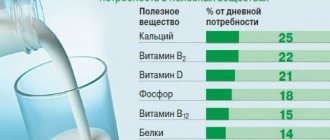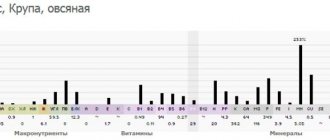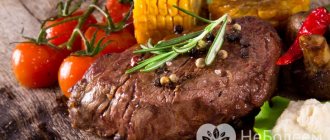Buckwheat was brought to us from Greece, which is why it got its name – buckwheat. Buckwheat is produced from the cereal crop - buckwheat, by cleaning the grain from the hard shell. Buckwheat stores well, does not go rancid, and is widely used for preparing various dishes.
After cleaning, the grain can be steamed, roasted or crushed. But vitamins are best preserved in unfried whole grains - buckwheat.
Despite its high calorie content, buckwheat is a dietary product due to its balanced combination of nutrients and fiber.
Table: calorie content of dry buckwheat, 100 grams of product contains:
| How much fat? | 2.6 g |
| How many carbohydrates? | 68 g |
| How many proteins? | 12.6 g |
| Total calories | 345 kcal |
Carbohydrates in cereals take longer to digest, which is why they are called “slow”; they create a feeling of fullness for a long time, which promotes weight loss. Many dishes are prepared from buckwheat: with milk, with mushrooms, with meat, with stew, with onions and vegetables - it goes well with a variety of products.
With milk
| Name | Quantity | fats | carbohydrates | squirrels | Total kcal |
| Buckwheat (half a glass) | 110 gr | 1.3 | 34 | 6.3 | 173 |
| Milk (1 glass) | 240 ml | 10.36 | 0 | 7.68 | 124 |
| Water (1 glass) | 240 ml | 0 | 0 | 0 | 0 |
| Sugar (1 tablespoon) | 30 gr | 0 | 29.9 | 0 | 119 |
| Total calories per 2 servings/270 grams | 550 | 105 | 255 | 56 | 416 |
Traditionally, porridge is cooked in milk; this also applies to buckwheat; 100 grams of buckwheat with milk contains only 76 kcal. To improve the taste, buckwheat porridge with milk can be seasoned with butter, then the taste will become even more delicate. The calorie content of boiled buckwheat porridge with milk, butter and sugar increases by about 50 kcal/100 grams.
Rich in amino acids and gluten free
It’s worth noting right away that gluten itself is not a villain. This cereal protein may only be dangerous for people who are sensitive to it or have an intolerance to this protein.
But thanks to its “gluten-free” nature, buckwheat porridge is breaking into the leadership of the healthiest porridges. After all, a large amount of this protein in the diet can negatively affect the health of the digestive system.
And the protein in buckwheat is complete - this means that you can get all the essential amino acids with a serving of buckwheat. Among them, the most important for you are:
- tryptophan - from it two very important hormones are formed in your body - the sleep hormone melatonin and the good mood hormone serotonin;
- You need lysine for energy and active brain function; if it is deficient, memory decreases and it is difficult for you to concentrate;
- valine is an amino acid for actively exercising, but even if you don’t have much physical activity in your life, valine helps maintain muscle and bone mass;
- Leucine – helps you feel full faster and promotes weight loss.
And so that you don’t get tired of buckwheat porridge, diversify your diet with other porridges. Either way, you'll get a lot of nutrients from healthy foods.
With stew
| Name | Quantity | fats | carbohydrates | squirrels | Total kcal |
| Buckwheat (2.5 cups) | 500 gr | 13 | 340 | 63 | 1729 |
| Stew (1 can) | 400 gr | 69.6 | 0 | 56.4 | 852 |
| Water (5 glasses) | 1.2 l | 0 | 0 | 0 | 0 |
| Onion (2 pcs) | 200 gr | 0 | 20.8 | 2.8 | 96 |
| Carrots (1 piece) | 100 gr | 0.1 | 6.9 | 1.3 | 35 |
| Volume. pasta (3 tablespoons) | 100 gr | 1.5 | 16.7 | 5.6 | 104 |
| Butter (3 tablespoons) | 100 gr | 82.5 | 0.8 | 0.5 | 744 |
| Total calories in 9 servings/250 grams | 2350 gr | 1500 | 1540 | 519 | 3560 |
100 grams of buckwheat with stew contains 151 kcal.
Stewed dishes are universal, easy to prepare and valued for their high taste.
How to use
Eating buckwheat for weight loss will not bring the desired result if you combine it with certain foods:
- fat meat;
- sugar;
- smoked meats;
- sauces, mayonnaise;
- oil in large quantities.
It is advisable to eat any buckwheat dishes in the first half of the day. It is not forbidden to eat them in the evening, but no later than 18:00. You cannot eat buckwheat at night, as the product takes 1.5-2 hours to digest, which will not allow the digestive system to fully rest.
For fasting days, it is recommended not to cook the cereal, but to soak it. Then it retains more vitamins and microelements. To do this, you will need 200 ml of boiling water for 1 glass: steam it in a thermos in the evening and leave it overnight. In the morning, drain off the remaining liquid. There is no need to add salt or add anything. Divide the resulting dish into 5-6 servings and eat throughout the day.
If the bland taste of the porridge is unbearable, then you can add a little chopped herbs, kelp (seaweed) or a spoonful of honey.
With daily mental stress, such a poor diet can provoke increased cravings for sweets. Then you should mix porridge with dried fruits for breakfast, and drink a glass of honey water on an empty stomach every morning.
You can’t eat buckwheat alone for a long time, maximum 5–7 days. Otherwise, the body begins to lack minerals and other nutritional components. Therefore, they additionally eat fresh fruits and vegetables, eggs, sea fish, white meat and drink a lot. The result of losing weight in this way depends not only on the amount eaten, but also on optimal physical activity.
Buckwheat diet
The buckwheat diet is indicated not only for weight adjustment, but also in case of certain health problems. Cereals can be eaten in any form: boiled, steamed, soaked in kefir, baked. The menu for the day is varied, but within acceptable limits regarding the food set.
The advantage of such a diet is that buckwheat is allowed to be eaten in unlimited, but reasonable quantities. Because of this, those losing weight do not experience discomfort throughout the entire restrictive period. There is no need to count calories every day. In a week you can lose 7-8 kilograms while maintaining muscle mass.
The essence of the buckwheat diet:
- Eat 4-5 times in small portions. To avoid overeating, it is recommended to replace your usual plates with smaller ones, with a volume of 200–250 g.
- Drink up to 2 liters of water per day.
- Exclude from the diet foods and unhealthy drinks that are not included in the menu: store-bought juices, sweet soda, alcohol.
- Minimize salt intake.
- Stop eating 3 hours before bedtime.
Additional drinks: kefir (1% fat), still mineral water, green tea and herbal infusions. If you have an increased craving for sweets, then drink honey water: 1 tsp per glass. Suitable snacks include: green apples, oranges, grapefruit. You can eat no more than one fruit per day.
For the first 2–3 days, the basic dish is raw buckwheat porridge, then it is allowed to include various dietary recipes from cereals. Usually this regime is followed for a week, but if you are comfortable, it can be longer.
Options for light short-term buckwheat diets:
- Kefir. A fermented milk product is added to the classic version at the rate of 1 liter per day. They wash it down with porridge or put it directly into it.
- With fruits and vegetables . Any fruit except grapes, bananas, dates is mixed or eaten whole. Additionally include fresh or steamed non-starchy vegetables.
- Strengthening . The most varied nutritional option, where in addition to buckwheat it is acceptable to eat something else: cottage cheese for breakfast, veal and vegetable salad for lunch. Portions on this diet are larger, but the number of meals is reduced to 3.
If you eat only buckwheat, without salt and oil, then excess weight will go away very quickly. However, this is an emergency measure that will not bring health benefits.
With vegetables
| Name | Quantity | fats | carbohydrates | squirrels | Total kcal |
| Buckwheat (1 cup) | 220 gr | 5.72 | 150 | 27.7 | 760 |
| Water (2 glasses) | 480 ml | 0 | 0 | 0 | 0 |
| Carrots (1 piece) | 100 gr | 0.1 | 6.9 | 1.3 | 35 |
| Bow (1 piece) | 100 gr | 0 | 10.4 | 1.40 | 47.2 |
| Tomato (1 piece) | 100 gr | 0.2 | 4.2 | 0.6 | 21 |
| Sweet pepper (1 piece) | 100 gr | 0 | 5.3 | 1.3 | 26.4 |
| Sunflower oil (3 tablespoons) | 100 ml | 99.86 | 0 | 0 | 898.7 |
| Total calories in 4 servings of 260 grams | 1100 gr | 952 | 707 | 129 | 1789 |
Juicy buckwheat with bright, healthy and low-calorie vegetables is a wonderful alternative to regular porridge, calorie content is only 162 kcal per 100 grams.
If you need to reduce calories, try using less oil.
- We recommend reading: cleansing the body with buckwheat and kefir
With meat
| Name | Quantity | fats | carbohydrates | squirrels | Total kcal |
| Buckwheat (2.5 cups) | 500 gr | 13 | 340 | 63 | 1729 |
| Fillet of beef | 500 gr | 62 | 0 | 94.5 | 936 |
| Bow (1 piece) | 100 gr | 0 | 10.4 | 1.40 | 47.2 |
| Carrots (1 piece) | 100 gr | 0.1 | 6.9 | 1.3 | 35 |
| Tomato. pasta (3 tbsp.) | 100 gr | 1.5 | 16.7 | 5.6 | 104 |
| Water (6 glasses) | 1.4 l | 0 | 0 | 0 | 0 |
| Vegetable oil (2 tablespoons) | 60 ml | 59.91 | 0 | 0 | 539 |
| Total calories per 10 servings/250 grams | 2500 gr | 1228 | 1496 | 663 | 3390 |
Buckwheat with meat turns out especially tasty if you bake it in pots; the energy value is only 135 kcal per 100 grams.
With mushrooms
| Name | Quantity | fats | carbohydrates | squirrels | Total kcal |
| Buckwheat (glass) | 220 gr | 5.72 | 150 | 27.7 | 760 |
| Champignon mushrooms) | 300 gr | 3 | 0.3 | 12.9 | 80 |
| Onion (2 pcs) | 200 gr | 0 | 20.8 | 2.8 | 96 |
| Vegetable oil (1 table spoon) | 30 gr | 29.96 | 0 | 0 | 270 |
| Water (2 glasses) | 480 ml | 0 | 0 | 0 | 0 |
| Total calories per 5 servings/220 grams | 1100 gr | 348 | 684 | 174 | 1206 |
Buckwheat porridge with mushrooms contains - a traditional Russian dish can be prepared with any mushrooms: dried, frozen, fresh.
The energy value of buckwheat with champignons is about 109 kilocalories per 100 grams.
How many carbohydrates are in 100 grams of boiled buckwheat in water?
When counting carbohydrates in buckwheat, you must remember that their content depends on the cooking method. 100 g of buckwheat contains:
- raw – 71.5 g carbohydrates;
- after heat treatment – 20 g.
When broken down in the body, the substances contained in cereals release a huge amount of energy, which can provide energy for the whole day. The main source of energy in buckwheat is starch. Its peculiarity is its slow disintegration, accompanied by a large release of energy. The product also contains a large amount of fibers, which have a beneficial effect:
- to balance sugar levels;
- weight normalization;
- reducing the risk of heart disease;
- reducing cholesterol levels.
With onion
| Name | Quantity | fats | carbohydrates | squirrels | Total kcal |
| Buckwheat (glass) | 220 gr | 5.72 | 150 | 27.7 | 760 |
| Bow (1 piece) | 100 gr | 0 | 10.4 | 1.40 | 48 |
| Oil drain. (1 tbsp) | 30 gr | 24.75 | 0.24 | 0.15 | 225 |
| Water (2 glasses) | 480 ml | 0 | 0 | 0 | 0 |
| Total calories per 3 servings/240 grams | 730 | 274 | 642 | 117 | 1033 |
Tender, crumbly buckwheat with onions and dietary gravy will perfectly satisfy hunger and is suitable for those who want to lose weight, because the calorie content per 100 grams is only 141 kcal.
With Chiken
| Name | Quantity | fats | carbohydrates | squirrels | Total kcal |
| Buckwheat (glass) | 220 gr | 5.72 | 150 | 27.7 | 760 |
| Chicken carcass (1 piece) | 1.2 kg | 154 | 0 | 176 | 2090 |
| Carrots (1 piece) | 100 gr | 0.1 | 6.9 | 1.3 | 35 |
| Bow (1 piece) | 100 gr | 0 | 10.4 | 1.40 | 47.2 |
| Sunflower oil (2 tablespoons) | 60 ml | 59.91 | 0 | 0 | 539 |
| Mayonnaise (1 tbsp.) | 30 gr | 20.1 | 0.78 | 0.93 | 188 |
| Water (2 cups) | 480 ml | 0 | 0 | 0 | 0 |
| Total calories per 7 servings/220 grams | 1600 gr | 2160 | 672 | 828 | 3660 |
Chicken stuffed with buckwheat is an appetizing, aromatic and very tasty dish that is perfect for a holiday table. The energy value of buckwheat with chicken is 228 kcal/100 grams.
The fairly high calorie content of the dish can be reduced if you do not coat the chicken with mayonnaise and stew the vegetables without vegetable oil; the calorie content will decrease by about 50 kcal/100 grams.
Beneficial features
Buckwheat can be a complete substitute for meat, which is explained by its nutritional capabilities. Thanks to its rich chemical composition, it is able to saturate the human body with essential vitamins and microelements. It is recommended to include it in your daily diet to avoid many health problems.
Useful properties of buckwheat:
- Stabilizes blood pressure and hematopoiesis.
- Positively affects the musculoskeletal component.
- Activates the central nervous system and enhances brain activity.
- Serves as protection against malignant neoplasms.
- Prevents the development of cardiovascular diseases, strengthens vascular walls.
- Normalizes digestion: improves intestinal motility, relieves constipation.
- Increases immunity.
- Reduces “bad” cholesterol and hemoglobin levels in the blood.
- Cleanses away impurities and toxins.
- Uplifts your mood and energizes you.
- Helps eliminate swelling and inflammation due to arthrosis, arthritis and rheumatism.
Buckwheat dishes are recommended for constant consumption by children, which contributes to the normal development of the growing body. At the same time, mental abilities improve: concentration and memory. People involved in sports need such a nutritional supplement to gain muscle mass. This is due to the saturation of buckwheat with carbohydrates, which during the digestion process release a large supply of energy. Against this background, training is more productive.
For men, systematic consumption of buckwheat dishes will help in case of problems with potency and prevent inflammatory processes in the prostate gland.
Buckwheat is no less useful for women, as it improves appearance: it has a positive effect on the skin, structure of hair and nails. As a result, acne and irritation on the face disappear, and the skin becomes more elastic. Thanks to the cereal, hormonal levels return to normal, which is especially important during the onset of menopause and shortly before.
During pregnancy
During pregnancy, it is recommended to consume buckwheat regularly, as it is a valuable supplier of vital substances for both mother and child. Folic acid in its composition helps the proper development of the baby's central nervous system and prevents premature birth.
The high iron content makes cereal an indispensable remedy for the prevention of anemia. Its other components have a beneficial effect on the heart and blood vessels: they prevent varicose veins, control blood pressure, and protect against the development of atherosclerosis. It is impossible to gain weight on such dishes.
When breastfeeding, a woman should especially monitor her diet so as not to harm the baby. Eating buckwheat allows you to avoid many digestive problems in a newborn: bloating, colic and allergies.
When losing weight
Buckwheat is considered a dietary but nutritious product. Therefore, it is easy to lose weight on it, without the constant hunger inherent in many diets. Buckwheat dishes fill you up well and for a long time, which eliminates unnecessary snacks during the day. Despite the meager diet during such weight loss, the body does not experience much stress. This is due to the balanced and rich chemical composition of the cereal.
Intensive fat burning occurs due to:
- improving bowel function;
- enhancing metabolism;
- removal of excess fluid from the body;
- cleansing of waste and toxins.
It is enough to replace 1-2 meals a day in your usual menu with dietary buckwheat dishes, due to which you can lose up to 2 kg of excess weight in 7 days.
Content of useful elements in buckwheat
Table: content of microelements and vitamins per 100 grams of dry buckwheat
| Name | Content | Daily requirement % |
| Co (cobalt) | 3.1 mcg | 0.31 |
| PP (niacin) | 4.19 mg | 17 |
| K (potassium) | 380 mg | 19 |
| Ca (calcium) | 20 mg | 2 |
| Mg (magnesium) | 200 mg | 57 |
| B9 (folic acid) | 32 mcg | 3.2 |
| B1 (thiamine) | 0.43 mg | 29 |
| B6 (pyridoxine) | 0.4 mg | 20 |
| Fe (iron) | 6.6 mg | 44 |
| Cu (copper) | 0.64 mg | 43 |
| B2 (riboflavin) | 0.2 mg | 12 |
Buckwheat also contains manganese, chromium, silicon and zinc.
THESE ARTICLES WILL HELP YOU LOSE WEIGHT
Composition of buckwheat
Most often, buckwheat kernels are used for food - unsteamed and without husks, whole buckwheat grains of a rich brown color. This is the richest product in biochemical composition. It contains:
- starch;
- saturated and unsaturated fatty acids;
- mono- and disaccharides;
- vitamins: groups B, E, A, PP;
- micro- and macroelements: iron, phosphorus, magnesium, potassium, calcium, sodium, sulfur, silicon, iodine, zinc;
- organic acids: oxalic, citric, malic;
- arginine, lysine;
- routine;
- choline;
- folic and nicotinic acid;
- cellulose.
